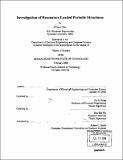| dc.contributor.advisor | Jin A. Kong and Bae-Ian Wu. | en_US |
| dc.contributor.author | Diao, M'baye, S.M. Massachusetts Institute of Technology | en_US |
| dc.contributor.other | Massachusetts Institute of Technology. Dept. of Electrical Engineering and Computer Science. | en_US |
| dc.date.accessioned | 2007-01-10T16:47:12Z | |
| dc.date.available | 2007-01-10T16:47:12Z | |
| dc.date.issued | 2006 | en_US |
| dc.identifier.uri | http://hdl.handle.net/1721.1/35606 | |
| dc.description | Thesis (S.M.)--Massachusetts Institute of Technology, Dept. of Electrical Engineering and Computer Science, 2006. | en_US |
| dc.description | "February 2006." | en_US |
| dc.description | Includes bibliographical references (leaves 71-74). | en_US |
| dc.description.abstract | The study of metamaterials has brought about new changes in modern microwave communication systems. As predicted by Veselago some 37 years ago, substances which exhibit simultaneously, negative permittivity ([epsilon]) and negative permeability ([mu]) over a certain range of frequencies would display some unusual phenomena such as backward waves, reversed refraction, backward Cerenkov radiation, and negative refractive index. Because of these new features of left handed materials, many structures such as split rings resonators (SRR) have been proposed in the literature to artificially fabricate radio frequency and microwave components. Due to their bulk properties, periodic arrays of SRRs provide a negative permeability. Therefore under the fundamental limit of effective medium theory that the dimensions of the lattice are much smaller than the wavelength, we can treat the array of SRRs as bulk material and retrieve its effective parameters. | en_US |
| dc.description.abstract | (cont.) Also because of size reduction and selective passband transmission spectra in planar geometry, split rings resonators are designed under the fundamental limit (dimensions of one-tenth of the wavelength or smaller), and as a result they constitute better candidates than their L-C loaded transmission lines counterparts for microwaves applications. The generalized formula for impedance-loaded transmission line is derived. The dispersion characteristic and impedance of structures with periodic resonators are analyzed as well. | en_US |
| dc.description.statementofresponsibility | by M'baye Diao. | en_US |
| dc.format.extent | 74 leaves | en_US |
| dc.format.extent | 2234645 bytes | |
| dc.format.extent | 2398771 bytes | |
| dc.format.mimetype | application/pdf | |
| dc.format.mimetype | application/pdf | |
| dc.language.iso | eng | en_US |
| dc.publisher | Massachusetts Institute of Technology | en_US |
| dc.rights | M.I.T. theses are protected by copyright. They may be viewed from this source for any purpose, but reproduction or distribution in any format is prohibited without written permission. See provided URL for inquiries about permission. | en_US |
| dc.rights.uri | http://dspace.mit.edu/handle/1721.1/7582 | |
| dc.subject | Electrical Engineering and Computer Science. | en_US |
| dc.title | Investigation of resonators loaded periodic structures | en_US |
| dc.type | Thesis | en_US |
| dc.description.degree | S.M. | en_US |
| dc.contributor.department | Massachusetts Institute of Technology. Department of Electrical Engineering and Computer Science | |
| dc.identifier.oclc | 75282884 | en_US |
